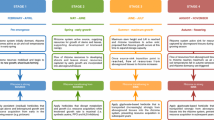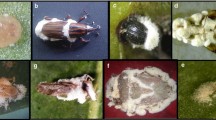Abstract
The exotic plant Parthenium hysterophorus is rapidly invading ecosystems in sub-Saharan Africa, with negative effects on the environment, economy and human and animal health. With the exception of some synthetic herbicides, none of the available management methods have been effective against P. hysterophorus, and carry risks to the environment. Therefore, additional management methods must be explored for an effective integrated approach. Despite the fact that bio-herbicides are considered cost-effective and eco-friendly in mitigating biological invasions, little work has been done to utilize them for controlling P. hysterophorus. We investigated allelopathic effects and, thus, bio-herbicide potential of naturalised Desmodium uncinatum leaf (DuL) crude extract in various concentrations to control P. hysterophorus. Our results revealed that DuL crude extract can suppress P. hysterophorus, particularly at higher concentrations. The 75% and 100% DuL crude extract concentrations reduced the total leaf chlorophyll content by 26% and 22% in pots and plots, respectively. Further, these higher concentrations inhibited P. hysterophorus seed germination by 73% in petri dishes, 60% in pots, and 57% in plots, and negatively interfered with seedling growth vigour. Seedling stem heights under 75% and 100% DuL concentrations in pot and plot experiments was about 30% and 36% shorter than those sprayed with lower concentrations (< 70%) and the control, respectively. We show that naturalised plants with allelochemicals can be used as a management tool for controlling P. hysterophorus infestations in sub-Saharan Africa, particularly in Tanzania, and this method should become part of an integrated control toolkit being deployed in a community-based approach.





Similar content being viewed by others
References
Adhikari D, Tiwary R, Barik SK (2015) Modelling hotspots for invasive alien plants in India. PLoS ONE 10:e0134665. https://doi.org/10.1371/journal.pone.0134665
Adkins S, Shabbir A (2014) Biology, ecology and management of the invasive Parthenium weed (Parthenium hysterophorus L.): management of Parthenium weed. Pest Manag Sci 70:1023–1029. https://doi.org/10.1002/ps.3708
Ammondt SA, Litton CM (2012) Competition between native Hawaiian plants and the invasive grass Megathyrsus maximus: implications of functional diversity for ecological restoration. Restor Ecol 20:638–646. https://doi.org/10.1111/j.1526-100X.2011.00806.x
Axmacher JC, Sang W (2013) Plant invasions in China—challenges and chances. PLoS ONE 8:e64173. https://doi.org/10.1371/journal.pone.0064173
Bajwa AA, Farooq M, Nawaz A et al (2019) Impact of invasive plant species on the livelihoods of farming households: evidence from Parthenium hysterophorus invasion in rural Punjab, Pakistan. Biol Invasions. https://doi.org/10.1007/s10530-019-02047-0
Balbuena MS, Tison L, Hahn M-L et al (2015) Effects of sublethal doses of glyphosate on honeybee navigation. J Exp Biol 218:2799–2805. https://doi.org/10.1242/jeb.117291
Brunel S, Panetta D, Fried G et al (2014) Preventing a new invasive alien plant from entering and spreading in the Euro-Mediterranean region: the case study of Parthenium hysterophorus. EPPO Bull 44:479–489. https://doi.org/10.1111/epp.12169
Callaway RM, Cipollini D, Barto K et al (2008) Novel weapons: invasive plant suppresses fungal mutualists in America but not in its native Europe. Ecology 89:1043–1055. https://doi.org/10.1890/07-0370.1
Cappuccino N, Carpenter D (2005) Invasive exotic plants suffer less herbivory than non-invasive exotic plants. Biol Lett 1:435–438. https://doi.org/10.1098/rsbl.2005.0341
Christina M, Rouifed S, Puijalon S et al (2015) Allelopathic effect of a native species on a major plant invader in Europe. Sci Nat. https://doi.org/10.1007/s00114-015-1263-x
Cipollini KA, Flint W (2013) Comparing allelopathic effects of root and leaf extracts of invasive Alliaria petiolata, Lonicera maackii and Ranunculus ficaria on the germination of three native woodland plants. Ohio J Sci 112:37–43
Clark K, Lotter W (2011) What is Parthenium weed up to in Tanzania. Int Parthenium News 3:1–2
Crall AW, Jordan R, Holfelder K et al (2013) The impacts of an invasive species citizen science training program on participant attitudes, behavior, and science literacy. Public Underst Sci 22:745–764. https://doi.org/10.1177/0963662511434894
Cummings J, Parker I, Gilbert G (2012) Allelopathy: a tool for weed management in forest restoration. Plant Ecol 213:1975–1989. https://doi.org/10.1007/s11258-012-0154-x
Dhileepan K (2012) Reproductive variation in naturally occurring populations of the weed Parthenium hysterophorus (Asteraceae) in Australia. Weed Sci 60:571–576. https://doi.org/10.1614/WS-D-12-00005.1
Ellison CA, Cock MJW (2017) Classical biological control of Mikania micrantha: the sustainable solution. CAB Int. https://doi.org/10.1079/9781780646275.0162
Foxcroft LC, Richardson DM, Rejmánek M, Pyšek P (2010) Alien plant invasions in tropical and sub-tropical savannas: patterns, processes and prospects. Biol Invasions 12:3913–3933. https://doi.org/10.1007/s10530-010-9823-7
Frimpong JO, Ofori ESK, Yeboah S et al (2018) Evaluating the impact of synthetic herbicides on soil dwelling macrobes and the physical state of soil in an agro-ecosystem. Ecotoxicol Environ Saf 156:205–215. https://doi.org/10.1016/j.ecoenv.2018.03.034
Gabrielsen EK (1948) Effects of different chlorophyll concentrations on photosynthesis in foliage leaves. Physiol Plant 1(1):5–37. https://doi.org/10.1111/j.1399-3054.1948.tb07108.x
Gioria M, Le Roux JJ, Hirsch H et al (2019) Characteristics of the soil seed bank of invasive and non-invasive plants in their native and alien distribution range. Biol Invasions 21:2313–2332. https://doi.org/10.1007/s10530-019-01978-y
Guchu SM, Yenesew A, Tsanuo MK et al (2007) C-methylated and C-prenylated isoflavonoids from root extract of Desmodium uncinatum. Phytochemistry 68:646–651. https://doi.org/10.1016/j.phytochem.2006.11.035
Hejda M, Pyšek P, Jarošík V (2009) Impact of invasive plants on the species richness, diversity and composition of invaded communities. J Ecol 97:393–403. https://doi.org/10.1111/j.1365-2745.2009.01480.x
Hinz HL, Schwarzlaender M (2004) Comparing invasive plants from their native and exotic range: What can we learn for biological control? Weed Technol 18:1533–1541
Hiscox JT, Israelstam GF (1979) A method for the extraction of chlorophyll from leaf tissue without maceration. Can J Bot 57:1332–1334
Hooper AM, Tsanuo MK, Chamberlain K et al (2010) Isoschaftoside, a C-glycosylflavonoid from Desmodium uncinatum root exudate, is an allelochemical against the development of Striga. Phytochemistry 71:904–908. https://doi.org/10.1016/j.phytochem.2010.02.015
Islam MS, Jahan QSA, Bunnarith K, Viangkum S, Merca SD (2000) Evaluation of seed health of some rice varieties under different conditions. Bot Bull Acad Sineca 41:293–297
Isman MB, Grieneisen ML (2014) Botanical insecticide research: many publications, limited useful data. Trends Plant Sci 19:140–145. https://doi.org/10.1016/j.tplants.2013.11.005
Javaid A (2010) Herbicidal potential of allelopathic plants and fungi against Parthenium hysterophorus—a review. Allelopathy J 25:331–344
Kaur M, Aggarwal NK, Kumar V, Dhiman R (2014) Effects and management of Parthenium hysterophorus: a weed of global significance. Int Sch Res Not 2014:1–12. https://doi.org/10.1155/2014/368647
Khaliq A, Matloob A, Tanveer A et al (2011) Reduced doses of a sulfonylurea herbicide for weed management in wheat fields of Punjab, Pakistan. Chil J Agric Res 71:424–429. https://doi.org/10.4067/S0718-58392011000300013
Khan Z, Pickett J, Hassanali A et al (2008) Desmodium species and associated biochemical traits for controlling Striga species: present and future prospects. Weed Res. https://doi.org/10.1111/j.1365-3180.2008.00641.x
Kija B, Mweya C, Mwita M, Fumagwa R (2013) Prediction of suitable habitat for potential invasive plant species Parthenium hysterophorus in Tanzania: a short communication. Int J Ecosyst 3:82–89
Lwoga A, Lugenja M, Kajuni A (1984) Pasture research in Tanzania. In: Kategile JA (ed) pasture improvement research in Eastern and Southern Africa: proceedings of a workshop held in Harare, Zimbabwe, 17–21 Sept 1984. Ottawa, Ont., IDRC, 1985. 508 p.: ill
Maina JM, Mburu MWK, Mureithi JG et al (2006) Evaluation of legumes as cover crops for soil and weed management in smallholder coffee cropping systems in central Kenya. In: Proceedings of the 10th KARI Bien. Sci. Conf., “responding to demands and opportunities through innovative agricultural technologies, knowledge and approaches.” 2–17 Nov 2006, Nairobi, Kenya, p 8
Maistrello L, Dioli P, Bariselli M et al (2016) Citizen science and early detection of invasive species: phenology of first occurrences of Halyomorpha halys in Southern Europe. Biol Invasions 18:3109–3116. https://doi.org/10.1007/s10530-016-1217-z
Mcconnachie AJ, Strathie LW, Mersie W et al (2011) Current and potential geographical distribution of the invasive plant Parthenium hysterophorus (Asteraceae) in eastern and southern Africa: distribution of Parthenium hysterophorus in eastern and southern Africa. Weed Res 51:71–84. https://doi.org/10.1111/j.1365-3180.2010.00820.x
Midega CAO, Wasonga CJ, Hooper AM et al (2017) Drought-tolerant Desmodium species effectively suppress parasitic striga weed and improve cereal grain yields in western Kenya. Crop Prot 98:94–101. https://doi.org/10.1016/j.cropro.2017.03.018
Ming Chen B, Lin Peng S (2018) Allelopathic potential of native invasive plants: the evidence from southern China. Allelopathy J 43:43–52. https://doi.org/10.26651/allelo.j./2018-43-1-1128
Ngondya IB, Munishi L, Treydte AC, Ndakidemi PA (2016a) Demonstrative effects of crude extracts of Desmodium spp. to fight against the invasive weed species Tagetes minuta. Acta Ecol Sin 36:113–118. https://doi.org/10.1016/j.chnaes.2016.03.001
Ngondya IB, Munishi LK, Treydte AC, Ndakidemi PA (2016b) A nature-based approach for managing the invasive weed species Gutenbergia cordifolia for sustainable rangeland management. SpringerPlus. https://doi.org/10.1186/s40064-016-3480-y
Nickerson K, Flory SL (2015) Competitive and allelopathic effects of the invasive shrub Schinus terebinthifolius (Brazilian peppertree). Biol Invasions 17(2):555–564. https://doi.org/10.1007/s10530-014-0748-4
Nyasembe VO, Cheseto X, Kaplan F et al (2015) The invasive American Weed Parthenium hysterophorus can negatively impact malaria control in Africa. PLoS ONE 10:e0137836. https://doi.org/10.1371/journal.pone.0137836
Ojija F, Arnold SEJ, Treydte AC (2019) Impacts of alien invasive Parthenium hysterophorus on flower visitation by insects to co-flowering plants. Arthropod Plant Interactions. https://doi.org/10.1007/s11829-019-09701-3
Pickett J, Hooper A, Midega CA, Khan Z (2013) Allelopathy. In: Joel D, Gressel J, Musselman L (eds) Parasitic Orobanchaceae. Springer, Berlin, pp 459–467. https://doi.org/10.1007/978-3-642-38146-1_25
Pratt CF, Constantine KL, Murphy ST (2017) Economic impacts of invasive alien species on African smallholder livelihoods. Glob Food Secur 14:31–37. https://doi.org/10.1016/j.gfs.2017.01.011
Pyšek P, Richardson DM, Rejmánek M et al (2004) Alien plants in checklists and floras: towards better communication between taxonomists and ecologists. Taxon 53:131–143. https://doi.org/10.2307/4135498
Qasem JR, Foy CL (2001) Weed allelopathy, its ecological impacts and future prospects: a review. J Crop Prod 4:43–119. https://doi.org/10.1300/J144v04n02_02
Richardson DM, Pyšek P, Rejmánek M et al (2000) Naturalization and invasion of alien plants: concepts and definitions. Divers Distrib 6:93–107
Shabbir A, Dhileepan K, O’Donnell C, Adkins SW (2013) Complementing biological control with plant suppression: implications for improved management of parthenium weed (Parthenium hysterophorus L.). Biol Control 64:270–275. https://doi.org/10.1016/j.biocontrol.2012.11.014
Shrestha BB, Shabbir A, Adkins SW (2015) Parthenium hysterophorus in Nepal: a review of its weed status and possibilities for management. Weed Res 55:132–144. https://doi.org/10.1111/wre.12133
Tanveer A, Khaliq A, Ali HH et al (2015) Interference and management of parthenium: the world’s most important invasive weed. Crop Prot 68:49–59. https://doi.org/10.1016/j.cropro.2014.11.005
Terblanche C, Nänni I, Kaplan H et al (2016) An approach to the development of a national strategy for controlling invasive alien plant species: the case of Parthenium hysterophorus in South Africa. Bothalia. https://doi.org/10.4102/abc.v46i1.2053
Tsanuo MK, Hassanali A, Hooper AM et al (2003) Isoflavanones from the allelopathic aqueous root exudate of Desmodium uncinatum. Phytochemistry 64:265–273. https://doi.org/10.1016/S0031-9422(03)00324-8
Vilà M, Espinar JL, Hejda M et al (2011) Ecological impacts of invasive alien plants: a meta-analysis of their effects on species, communities and ecosystems: ecological impacts of invasive alien plants. Ecol Lett 14:702–708. https://doi.org/10.1111/j.1461-0248.2011.01628.x
Wabuyele E, Lusweti A, Bisikwa J, Kyenune G, Clark K, Lotter WD, McConnachie AJ, Wondi M (2015) A roadside survey of the invasive weed (Asteraceae) in East Africa. J East Afr Nat Hist 103(1):49–57
Warham EJ (1990) Effect of Tilletia indica infection on viability, germination and vigor of wheat seed. Plant Dis 74(2):130–132. https://doi.org/10.1094/PD-74-0130
Witt A, Luke Q (2017) In: Witt A, Luke Q (eds) Guide to the naturalized and invasive plants of Eastern Africa. Wallingford, UK: CABI.vi + 601 pp. http://www.cabi.org/cabebooks/ebook/20173158959, https://doi.org/10.1079/9781786392145.0000
Witt A, Beale T, van Wilgen BW (2018) An assessment of the distribution and potential ecological impacts of invasive alien plant species in eastern Africa. Trans R Soc S Afr 73:217–236. https://doi.org/10.1080/0035919X.2018.1529003
Yu X, Zheng S, Zheng M et al (2018) Herbicide accumulations in the Xingkai lake area and the use of restored wetland for agricultural drainage treatment. Ecol Eng 120:260–265. https://doi.org/10.1016/j.ecoleng.2018.06.009
Zhao H-B, Wu J-R, Xiao H-L, Chen B-M (2008) Allelopathic potential of native plants on invasive plant Mikania micrantha H.B.K. in South China. Allelopathy J 22(1):189–196
Acknowledgements
We acknowledge the support from World Bank through its African Centre of Excellence, “Centre for Research, Agricultural advancement, Teaching Excellence and Sustainability in Food and Nutritional Security (CREATES)”, in the School of Life Sciences and Bioengineering at the Nelson Mandela Institution of Science and Technology (NM - AIST) in Arusha, Tanzania, for funding this work. We also thank the Idea Wild for supporting us with research equipment.
Author information
Authors and Affiliations
Corresponding author
Ethics declarations
Conflict of interest
The authors declare that they have no conflict of interest.
Additional information
Publisher's Note
Springer Nature remains neutral with regard to jurisdictional claims in published maps and institutional affiliations.
Rights and permissions
About this article
Cite this article
Ojija, F., Arnold, S.E.J. & Treydte, A.C. Bio-herbicide potential of naturalised Desmodium uncinatum crude leaf extract against the invasive plant species Parthenium hysterophorus. Biol Invasions 21, 3641–3653 (2019). https://doi.org/10.1007/s10530-019-02075-w
Received:
Accepted:
Published:
Issue Date:
DOI: https://doi.org/10.1007/s10530-019-02075-w




